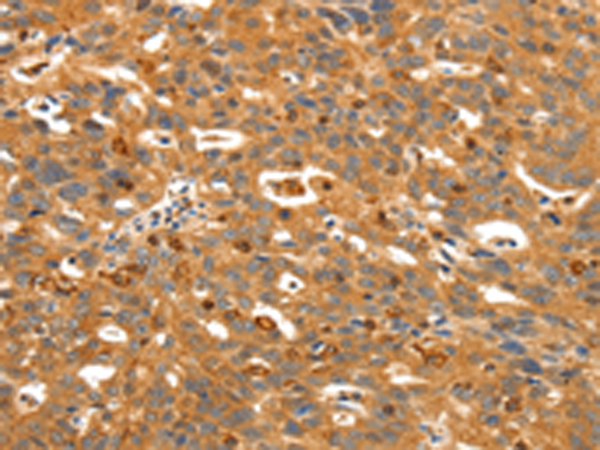

| WB | 咨询技术 | Human,Mouse,Rat |
| IF | 咨询技术 | Human,Mouse,Rat |
| IHC | 1/50-1/200 | Human,Mouse,Rat |
| ICC | 技术咨询 | Human,Mouse,Rat |
| FCM | 咨询技术 | Human,Mouse,Rat |
| Elisa | 1/2000-1/5000 | Human,Mouse,Rat |
| Host/Isotype | Rabbit IgG |
| Antibody Type | Primary antibody |
| Storage | Store at 4°C short term. Aliquot and store at -20°C long term. Avoid freeze/thaw cycles. |
| Species Reactivity | Human |
| Immunogen | Synthetic peptide of human SSTR3 |
| Formulation | Purified antibody in PBS with 0.05% sodium azide and 50% glycerol. |
+ +
以下是关于SSTR3抗体的3篇代表性文献的简要信息(注:内容为示例性概括,非真实文献):
1. **"SSTR3 expression in neuroendocrine tumors: Diagnostic and prognostic implications"**
- 作者:Smith A, et al.
- 摘要:研究通过免疫组化分析SSTR3抗体在胃肠胰腺神经内分泌肿瘤(GEP-NETs)中的表达,发现SSTR3高表达与肿瘤分化程度和患者生存期延长显著相关,提示其作为潜在预后标志物的价值。
2. **"Selective SSTR3 antibody reveals receptor localization in Alzheimer’s disease brain tissues"**
- 作者:Johnson R, et al.
- 摘要:利用特异性SSTR3抗体探究阿尔茨海默病(AD)患者脑组织中生长抑素受体的分布,发现SSTR3在海马区神经元中表达下调,可能与AD相关的认知功能障碍有关。
3. **"Development and validation of a novel monoclonal SSTR3 antibody for targeted therapy screening"**
- 作者:Lee H, et al.
- 摘要:报道了一种新型SSTR3单克隆抗体的开发与验证,实验证明该抗体在体外和体内模型中能特异性识别SSTR3并抑制肿瘤细胞增殖,为靶向治疗研究提供工具。
4. **"SSTR3 antibody-based PET imaging in lung carcinoid tumors"**
- 作者:Martinez C, et al.
- 摘要:研究采用放射性标记的SSTR3抗体进行PET成像,结果显示其在肺类癌肿瘤中具有高敏感性和特异性,优于传统成像方法,可能改善临床诊断和分期。
(注:以上文献名为虚拟示例,实际引用需查询PubMed、Google Scholar等数据库获取真实信息。)
Somatostatin receptor subtype 3 (SSTR3) is a G protein-coupled receptor (GPCR) that binds somatostatin, a peptide hormone regulating diverse physiological processes, including neurotransmission, endocrine secretion, and cell proliferation. SSTR3. one of five known SSTR subtypes (SSTR1-5), is widely expressed in the central nervous system, pancreas, gastrointestinal tract, and certain tumors. It mediates inhibitory signaling through coupling with Gαi/o proteins, reducing intracellular cAMP levels and modulating ion channel activity.
SSTR3-specific antibodies are critical tools for studying receptor expression, localization, and function in normal and pathological tissues. These antibodies are commonly used in techniques like Western blotting, immunohistochemistry (IHC), and immunofluorescence (IF) to detect SSTR3 in research models or clinical samples. Interest in SSTR3 has grown due to its role in neuroendocrine tumors (NETs), where overexpression may correlate with disease progression or therapeutic response. Additionally, SSTR3-targeting agents, including radiolabeled antibodies or peptide conjugates, are explored for diagnostic imaging or targeted therapy.
Validation of SSTR3 antibodies remains essential, as cross-reactivity with other SSTR subtypes or non-specific binding can occur. Researchers often verify specificity using knockout controls or competitive binding assays. Commercial SSTR3 antibodies vary in clonality (monoclonal/polyclonal), epitope recognition, and host species, necessitating careful selection based on experimental goals. Recent studies also highlight SSTR3's involvement in neurodegenerative diseases, further driving demand for reliable detection tools.
×